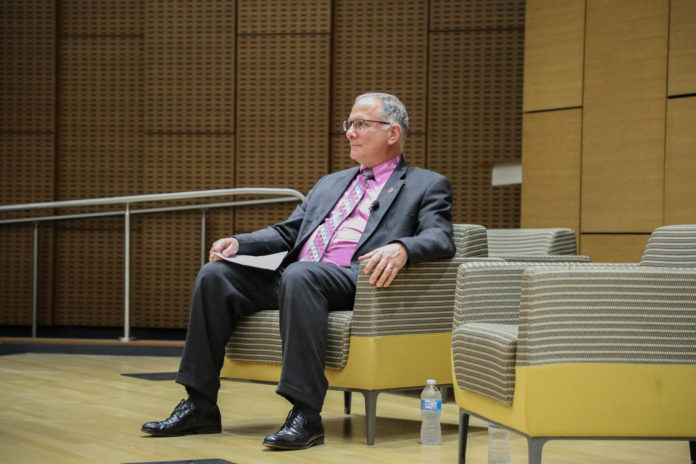
By Elisabeth George | Reporter
Dr. Peter Mansoor, retired army colonel and former CNN military analyst, gave a lecture Monday night titled, “The Muddled Middle East: what is its identity and how do we navigate it?”
Mansoor served in Iraq and helped edit a counterinsurgency manual that influenced the conduct of the Iraq War. He now teaches at The Ohio State University. Counterinsurgency is defined by the Department of State as “comprehensive civilian and military efforts taken to simultaneously defeat and contain insurgency and address its root causes.”
Held in McClinton Auditorium, Mansoor discussed the current political situation within the Middle East and why he believes the U.S. will not be able to remove themselves from the conflict any time soon.
“In the Middle East, Las Vegas rules do not apply. What happens in the Middle East does not stay in the Middle East,” Mansoor said.
After Mansoor discussed his main points, the stage was opened to questions from Dr. Peter Campbell, one of the faculty advisers for The Alexander Hamilton Society, and later on to audience members.
The organization, a national society based in Washington D.C., is self-described as a non-partisan, not-for-profit organization with the purpose of educating and promoting young individuals into careers in foreign policy and national security.
Baylor’s Alexander Hamilton Society hosted the lecture as their first event this semester.
Houston junior Alex Hale, president of the organization, described the society as a place for anyone, not just political science majors.
“The reason why we created this club is because we want you to realize how much [foreign policy] affects all of us,” Hale said. “If realizing how important it is to at least be educated on spurs you to a new interest, we can nurture that interest and we can help you out in realizing how your career, which you might not think is relevant to international politics, could actually fit very nicely with it.”
Oronoco, Minn., senior Sophia Fulton is the marketing officer for the organization. She described The Alexander Hamilton Society as “a student organization with the goal of having respectful dialogues around foreign policy questions, and the emphasis is on respectful and balanced dialogue.”
Hale said she believes that The Alexander Hamilton Society fills a gap in political conversation on Baylor’s campus.
“Baylor is a very politically ambiguous place. I wouldn’t say we have a lot of protests or political movements because a lot of students don’t care or are just apathetic about politics in general,” Hale said. “With this [organization] we want to bring in something that’s not partisan that starts a conversation that students don’t have at Baylor.”
The benefit of the dialogue promoted by this organization, both Hale and Fulton agree, is that there is no “correct” answer or side.
“A lot of times in politics and in foreign policy especially, there isn’t one right answer and there are so many different perspectives,” Fulton said. “If we can encourage students to just even acknowledge that there are different perspectives about foreign policy questions I think we will have succeeded as an organization.”




